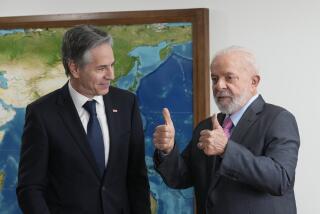Brazil’s Difficult Task: Resume Payments on Debt, Spur Economy
- Share via
RIO DE JANEIRO — As Brazil heads into difficult negotiations with its creditors, the government is formulating a plan aimed at resuming suspended foreign debt payments without sacrificing brisk economic growth.
Finance Minister Dilson Funaro told members of the government party in Brazil’s Congress last week that the official goal for growth through 1991 is 7% a year.
Funaro said Brazil will negotiate with foreign banks for new debt terms that would significantly lower the country’s total interest payments during the next four years. For the same period, he said, Brazil will seek additional foreign credits of $20 billion.
Many independent analysts see little hope for accomplishing all of those goals. Some say the country is already entering an industrial recession, and they predict that creditors will demand economic austerity in return for easier debt terms and new credits.
Funaro is expected to discuss the government’s plans this week in Washington with U.S. officials and a committee of the International Monetary Fund. Francisco Gros, the chairman of Brazil’s central bank, is scheduled to begin talks Friday in New York with a 14-bank committee representing Brazil’s 700 creditor banks.
“It’s going to be a very difficult negotiation,” said Joel Korn, BankAmerica’s country manager for Brazil. “It’s going to be complex, and it will take time.”
Korn said many small U.S. banks with outstanding loans to Brazil are reluctant to agree to any refinancing that would prolong or increase their exposure. “They want out,” he said.
Nevertheless, he emphasized in an interview that the banks do want to find new ways of dealing with Brazil’s debt burden so that it will not hamper the country’s long-term economic growth. “The interdependence between the banks and Brazil is so big that we all want a good solution to this,” he said.
Brazil startled its foreign bank creditors Feb. 20 by suspending interest payments on their loans. BankAmerica last week became the first of several banks to place loans to Brazil on non-accrual status, which means that overdue interest payments will no longer be counted as income.
The accounting move has been interpreted as a signal that the banks are prepared to show income losses rather than yield to Brazil’s initial negotiating terms under pressure from the moratorium.
Meeting last Thursday with congressmen of the official Brazilian Democratic Movement Party, Finance Minister Funaro said the country’s debt must be restructured to suit Brazil’s needs. “The sovereign renegotiation of the debt is not the solution for everything, but without it, there is no solution for anything,” he said.
In a paper outlining the government’s economic plans, Funaro sketched the following prospects and plans for balancing Brazil’s foreign payments:
Interest payments on Brazil’s $109-billion foreign debt will cost $9 billion to $10 billion a year if it is not restructured, he said in his paper. In addition, Brazil will need to increase its foreign currency reserves by $1 billion a year, while paying $2 billion a year in profit remittances, dividends and other foreign transfers.
That total of at least $12 billion a year will be impossible to meet and still maintain growth of 7% a year, according to Funaro. So the government will limit net foreign payments to about $8 billion a year. That limitation will create a need for about $4 billion a year in reduced debt payments and new foreign financing, he said.
Rate Reduction Preferred
“It would obviously be preferable that this gap in resources be covered mainly by a reduction in interest rates,” Funaro’s proposal said. “However, there are limits to the gains that can be obtained with a negotiated reduction in interest, making it necessary to combine that with automatic refinancing of interest payments,” it said.
In addition to lower interest rates and refinancing of interest payments, the proposal said Brazil will negotiate to convert some of its debt into investment in Brazilian development projects.
“Although it does not imply debt cancellation or concessionary interest rates, the Brazilian proposal requires the participation of foreign commercial banks, official and multilateral agencies, as well as investors,” the document said.
Funaro also previewed plans to keep the Brazilian economy growing and maintain low unemployment levels. He said the government will finance the construction of more than 200,000 homes a year, provide cheap credit to small businesses, guarantee more than $100 billion in investments this year by government-owned corporations and provide support prices and credit for farmers.
Brazil is bringing a record harvest of grains and beans, expected to assure growth this year in agriculture. Industrial growth, however, has dropped abruptly.
Carlos Eduardo Fereira, vice president of the Sao Paulo State Federation of Industries, said last week that the consumption of electricity by industry fell by 7.5% in February. He said the drop indicates that the country was heading into a recession.
Last year, industry boomed after President Jose Sarney froze prices and increased wages, triggering a strong wave of consumer demand.
The government began dismantling the price-freeze late last year after heavy domestic consumption caused widespread shortages and a sharp drop in exports.
With the price thaw came runaway inflation; the rates for January, February and March averaged more than 13% a month. While prices rose, interest rates exploded, and commercial and industrial activity declined.
As a result of the drop in exports, Brazil’s foreign reserves have dwindled to below $4 billion, a level considered dangerously low for the eighth-largest economy in the Western world. The decline in reserves was the main reason Brazil gave for suspending interest payments to foreign banks.
Private foreign banks account for about $70 billion of Brazil’s $109-billion foreign debt. The rest was loaned by foreign governments and international institutions such as the World Bank.
More to Read
Sign up for Essential California
The most important California stories and recommendations in your inbox every morning.
You may occasionally receive promotional content from the Los Angeles Times.









